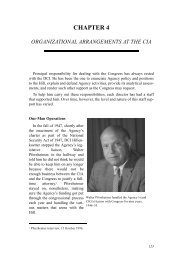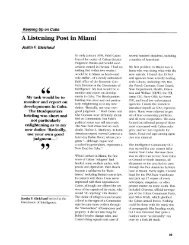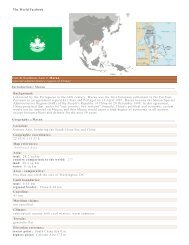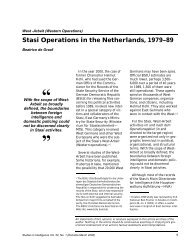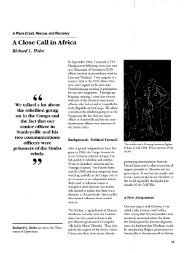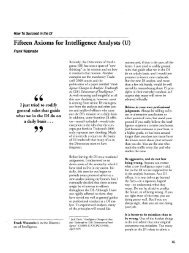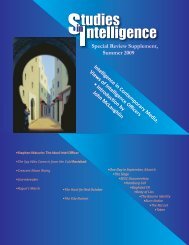Analytic Culture in the U.S. Intelligence Community (PDF) - CIA
Analytic Culture in the U.S. Intelligence Community (PDF) - CIA
Analytic Culture in the U.S. Intelligence Community (PDF) - CIA
You also want an ePaper? Increase the reach of your titles
YUMPU automatically turns print PDFs into web optimized ePapers that Google loves.
APPENDIX<br />
Hede Helfrich, “Human Reliability from a Social-Psychological Perspective,”<br />
International Journal Human-Computer Studies 50 (1999): 193–212.<br />
Erik Hollnagel, “The Phenotype of Erroneous Actions,” International Journal<br />
of Man-Mach<strong>in</strong>e Studies 39 (1993): 1–32.<br />
Daniel Kahneman and Amos Tversky, “Prospect Theory: An Analysis of<br />
Decision Under Risk,” Econometrica 47, no. 2 (1979): 263–91.<br />
Duncan Luce and Howard Raiffa, “Utility Theory” <strong>in</strong> Paul Moser, ed. Rationality<br />
<strong>in</strong> Action: Contemporary Approaches (New York: Cambridge University<br />
Press, 1990).<br />
Judith Orasanu and Lynne Mart<strong>in</strong>, “Errors <strong>in</strong> Aviation Decision Mak<strong>in</strong>g: A<br />
Factor <strong>in</strong> Accidents and Incidents” <strong>in</strong> Proceed<strong>in</strong>gs of <strong>the</strong> Work<strong>in</strong>g Group on<br />
Human Error, Safety, and System Development (Seattle, WA: International<br />
Federation for Information Process<strong>in</strong>g, 1998, 100–107).<br />
James Reason, Human Error (New York: Cambridge University Press, 1990).<br />
John Senders and Neville Moray, Human Error: Cause, Prediction and<br />
Reduction (Hillsdale, NJ: Earlbaum, 1991).<br />
Neville Stanton and Sarah Stevenage, “Learn<strong>in</strong>g to Predict Human Error:<br />
Issues of Acceptability, Reliability and Validity,” Ergonomics 41, no. 11<br />
(1998): 1737–56.<br />
Language and Cognition<br />
Terry K. Au, “Ch<strong>in</strong>ese and English Counterfactuals: The Sapir-Whorf<br />
Hypo<strong>the</strong>sis Revisited,” Cognition 15 (1983): 155-187.<br />
Alfred Bloom, The L<strong>in</strong>guistic Shap<strong>in</strong>g of Thought: A Study <strong>in</strong> <strong>the</strong> Impact of<br />
Language on Th<strong>in</strong>k<strong>in</strong>g <strong>in</strong> Ch<strong>in</strong>a and <strong>the</strong> West (Hillsdale, NJ: Lawrence<br />
Erlbaum Associates, 1981).<br />
Lera Boroditsky, “Does Language Shape Thought? Mandar<strong>in</strong> and English<br />
Speakers’ Conceptions of Time,” Cognitive Psychology 43 (2001):1–22.<br />
Ernest Cassirer, “Le Langage et le Monde des Objets,” Journal de Psychologie<br />
Nomale et Pathologique 30, 1(4) (1933): 18–44.<br />
John Gumperz and Dell Hymes, Directions <strong>in</strong> Sociol<strong>in</strong>guistics: The Ethnography<br />
of Communication (Oxford: B. Blackwell, 1986).<br />
———, and Stephen Lev<strong>in</strong>son, Reth<strong>in</strong>k<strong>in</strong>g L<strong>in</strong>guistic Relativity (Cambridge:<br />
Cambridge University Press, 1996).<br />
Harry Hoijer, “The Relation of Language to <strong>Culture</strong>” <strong>in</strong> Alfred Kroeber, ed.<br />
Anthropology Today (Chicago: University of Chicago Press, 1953).<br />
Wilhelm von Humboldt “Uber die Verschiedenheit des Menschlichen Sprachbaues”<br />
<strong>in</strong> B. Bohr, ed. Gesammelte Schriften (Berl<strong>in</strong>: Verlag, 1907).<br />
Earl Hunt and Franca Agnoli, “The Whorfian Hypo<strong>the</strong>sis. A Cognitive Psychology<br />
Perspective,” Psychological Review 98, no. 3 (1991): 377–89.<br />
136






